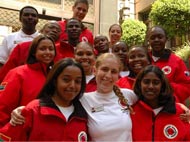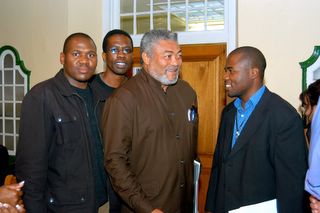Bate FelixPRETORIA, Sep 15 (IPS) - the electronic board in front of the class flickers, and a periodic table is projected onto the screen. "Do you all know what this is?" booms a voice from the loud speaker. "Yes!" the students’ chorus, as any typical class would.
Except that this class is far from typical.
While the students are seated in a computer laboratory at Gatang High School in Mamelodi, a poor, black residential area outside the capital of Pretoria, teacher Ron Bayers is located several kilometres away at St Albans -- a well-to-do private school in the city. The class talks and interacts seamlessly through a wireless broadband connection, which allows for high-speed transmission of sounds, images and other information.
Web cameras situated at both ends of the Gatang laboratory give Bayers a clear view of the class on a screen set up at his school, while the students can also hear him and see what he does, as he does it. Both teacher and pupils make use of electronic "SMARTboards" that enable instant displays of what is written on them.
In the past, students from several Mamelodi schools were bussed to St Albans to take extra lessons in a variety of subjects: there simply aren't enough teachers to instruct them in their own schools, especially in the sciences.
These shortages of staff -- also of teaching facilities and textbooks -- are a legacy of apartheid. Under the former system of white rule, little investment was made in education for black children, who were seen as destined for the unskilled labour market.
However, the bussing system limited the number of students who could be assisted. This set the stage for the electronic learning -- or "e-learning" -- project, which got underway in 2003 in five schools (the first class was given in 2004). The 'Mamelodi E-learning' initiative was spearheaded by Beyers.
"The availability of wireless broadband communication technologies and other state-of-the-art hardware and software tools led us to the vision that these might be harnessed for modern knowledge-sharing and teaching methods," he says.
While certain students found the prospect of e-learning somewhat daunting at first, they have long since lost their fears.
"At first it was scary, especially the first time you try to use the SMARTboard. But now, it's kinda cool," says 14-year-old Fortune Kgothatso. "It becomes more interesting with the new technology."
Adds Mpumelelo Mdlalose, 17: "We learnt quite a lot, especially the science part. It was funny at first with the teacher at the other end, but we started loving and enjoying it."
"We need this foundation here at school. If we don't, it will be difficult for us when we get to university."
Teachers, too, were apprehensive.
"Some teachers are scared because they think this can make them redundant -- that the project is going to take away their jobs, because one teacher might be able to teach more classes at different schools at the same time," says Gatang science teacher Leslie Hlengani, a staff member for the past 14 years -- and part of the e-learning project from its inception. (At present, Beyers only teaches one class at a time.)
But, Hlengani doesn't think the initiative is about to do away conventional schooling as we know it.
"I see it as more complementary. It helps the teachers to learn and develop more," he notes.
In addition, "It helps them (students) to review their lessons effectively," says Hlengani, who also supervises and assists during the e-classes. "It gives them the possibility to interact with the whole wide world, and gives access to very good study materials, giving them a fair chance to effectively compete with others in the matric exams."
The matriculation -- or matric -- examinations are the final tests written by South African pupils before leaving school.
While the e-learning project helps pupils overcome shortfalls in the education system, it also addresses the "digital divide": the gap between those who have access to information and communication technologies (ICTs), and those who don't -- perhaps through poverty or a lack of education.
The term is typically used to describe ICT discrepancies between wealthy and developing countries, which face challenges in becoming part of the global economy as a result. However, apartheid has left South Africa with its own digital divide, largely along racial lines.
"This (e-learning) is a way of bridging the digital divide that developing nations are facing. It exposes the children to the uses and potentials of the information and communication technologies available," says Beyers.
At present, Mamelodi E-learning is still a pilot project, with classes being held just once a week. A lot of work will have to be done before the initiative can be extended to other schools, although Hlengani believes e-learning will prove especially valuable for students in remote areas.
South Africa's Department of Education is monitoring the project to assess its viability on a broader scale.
"Factors such as cost, sustainability, effectiveness etc.are being evaluated," said Duncan Hindle, director general of the department. "The benefits of a project such as this cannot be underestimated in addressing the lack of competent teachers, and where learners are not exposed to the use of ICT in learning."
As the class at Gatang winds up, Bayers announces that he will not be online the following week -- and a collective sigh is heard. Can it be that learning about the periodic table has become fun?
First Published by IPS





















